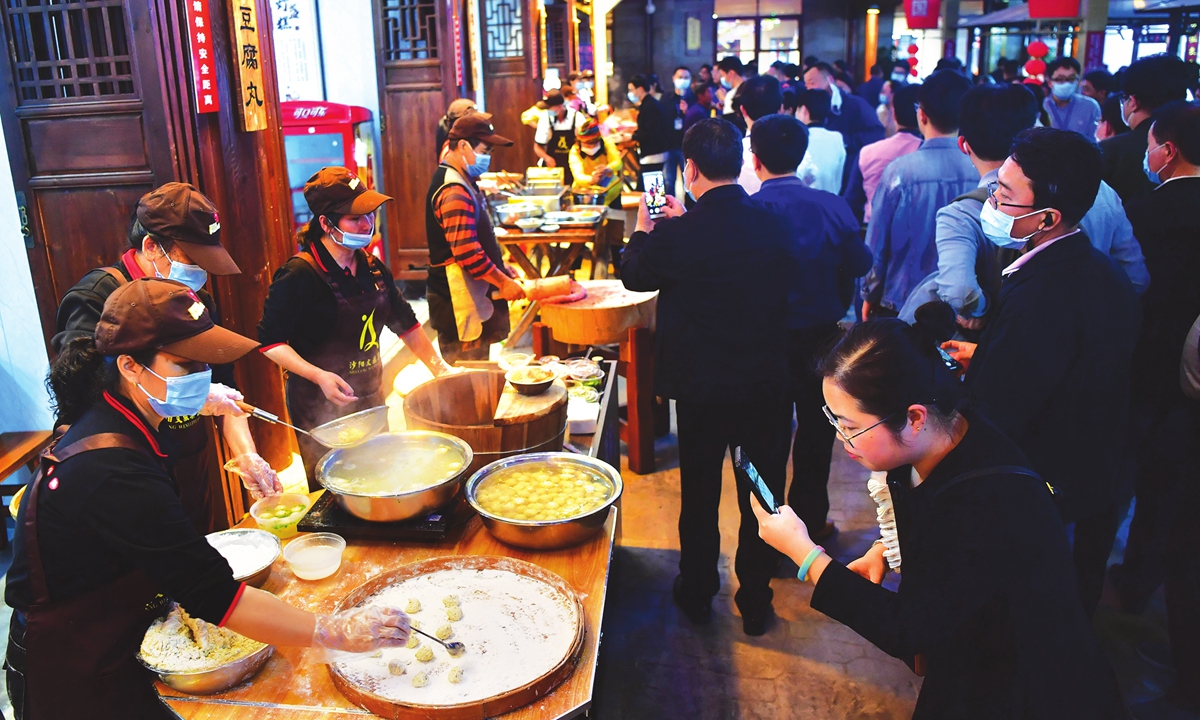
Tourists watch 15 snack makers show off traditional cooking methods in Wenchang Street of Shaxian, East China's Fujian Province. Shaxian is a famous part of the nation's snack culture. Photo: cnsphoto
Chinese President Xi Jinping encouraged continuous development of Shaxian delicacies, which have gone global, during his Tuesday inspection tour to Shaxian district in East China's Fujian Province.
Such local, distinctive restaurants are prevalent in China and reflect the prosperity of small entrepreneurship, which is recovering well after the COVID-19 onslaught.
During his visit, President Xi observed the current situation and prospects of Shaxian delicacies, urged people to further develop the brand, while recognizing its contribution to urbanization and rural revitalization.
Restaurants offering Shaxian delicacies, which originated in Xiamao township, Shaxian, are now scattered on the streets and lanes of many Chinese cities. Shaxian delicacies are popular for their convenience and cleanliness, with a variety of cheap and delicious choices such as dumplings, wontons and noodles. The delicacies have also spread to more than 60 countries and regions.
It is estimated that there are more than 88,000 Shaxian delicacy restaurants in China, with a business worth 50 billion yuan ($7.7 billion). About 300,000 people are employed in these restaurants, which are usually family-operated.
The success of Shaxian delicacies cannot be separated from the efforts of local governments at the beginning of the industry's development. Planning to foster it into a pillar industry of the services sector, Shaxian district government took the initiative to expand the market for Shaxian delicacies all over China with multiple policies in the 1990s.
Members of Communist Party of China (CPC) local committees played a leading role in encouraging villagers to go outside their hometowns to make a living by running Shaxian delicacies businesses and expanding their operations.
The unique business mode of experienced workers and entrepreneurs who introduced the business to newcomers and guided them remains prevalent today.
Wu Zhengwei, a 30-year-old entrepreneur from Xiamao town, opened his first Shaxian delicacy restaurant in Beijing six years ago. Wu now has more than 10 restaurants that bring in profits of 2 to 3 million yuan a year.
Wu told the Global Times on Wednesday that he entered the business by following in his fellow townsmen's steps, a common way of getting started for many employees and entrepreneurs in the industry. Shaxian delicacy entrepreneurs are well-connected, and they can share and get information from mature industry associations.
At the beginning of his career, Wu got support from his hometown government, such as bank loans and technical aid. Shaxian delicacies have become a "national brand" and they represent traditional cuisines that also promote Shaxian tourism. Shaxian people build up their hometowns and boost local employment too.
Known as the No.1 village of Shaxian delicacies, Yubang village in Xiamao has 670 people in this business working in other parts of China, accounting for 60 percent of its total villagers. The average annual income for an individual entrepreneur exceeds 100,000 yuan now.
An entrepreneur who preferred to be anonymous told the Global Times on Wednesday that the impact of the COVID-19 outbreak had been severe for his Shaxian delicacy restaurants in 2020, but the situation has improved as the virus has been contained in China. Having worked in the industry for 20 years, he is positive that Shaxian delicacies will make a fortune for him.
Wu said that the recovery of customer flows at his restaurants in March was beyond his expectations and almost equal to the time before the coronavirus hit.
